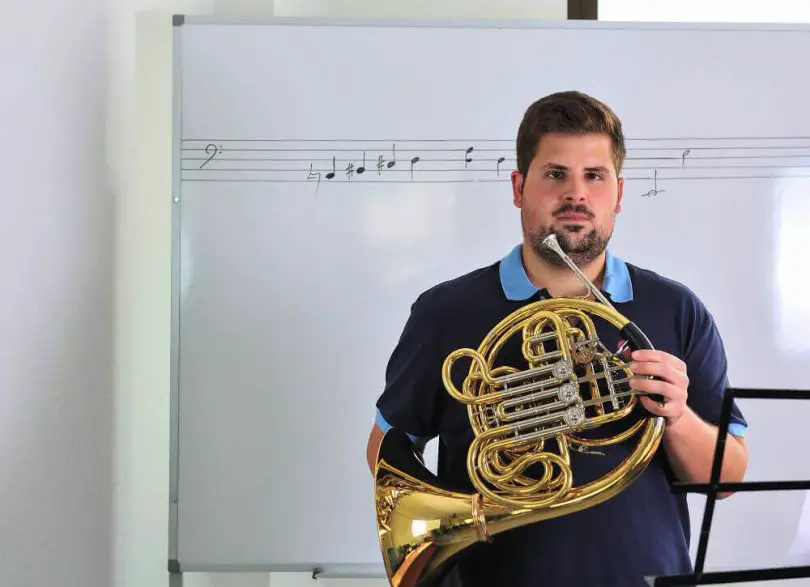By its very nature, the french horn is difficult to play and is considered one of the most difficult musical instruments to learn and play. It can only be mastered by a skilled modern horn player due to its difficulty. But why is this so? We are answering this question in this article.
The French horn is regarded as the most beautiful brass instrument in existence. Not only that, but when it’s uncoiled, it’s one of the most distinctive brass instruments, just like hunting horns were in the past.
The french horn has been a part of the orchestra family for a long time, performing in a variety of genres, and the listener has always adored it. However that is only the story you hear from the audience. All players of the French horn usually have a different story to tell.
Reasons why the french horn is difficult to play:
The main reason why french horn is difficult to play is firstly because of the arrangement of its notes around the easiest octave to play. The notes are so close to each other that it is very easy to make mistakes while playing it. The mouthpiece of the french horn is another difficulty that players have to struggle with.
If the mouthpiece is not well-placed, it will produce very poor sound and unlike other instruments, the french horn mouthpiece’s positioning is easily missed. Let’s take a look at how the french horn is designed and played and explore all the difficulties.
-
Difficulty From Octaves
The French horn has the broadest range of any brass instrument. Its whole range is from A1 to F5, and it is normally played in treble clef, but due to its large range, it is also performed in bass clef. Despite having the most range (5 octaves), the French horn is actually the third loudest sounding instrument, after the trumpet and cornet, which are the loudest and second loudest, correspondingly.
Now, since the range is so wide, the player must master additional techniques in order to make a lovely sound. When blowing higher notes, the French horn is generally played in its higher register, which necessitates faster respiration and increased lip strain.
In most cases, a French horn is played in the keys of F or B. An F horn is tuned to E on a regular basis, whereas a B horn is set to the A key. A valve is used to do this. The length of your French horn will tell you which key it is in.
The F key horn, which is the most popular, has a longer coil and so a greater circumference, but the B has a shorter coil and hence appears smaller. French horns are most usually played in F because it provides for more access to the whole musical spectrum, particularly the upper notes, which is ideal for beginners learning to play so they can get a feel for the instrument’s full range.
This is why, in most concerts and recitals, the French horn is performed in the key of F. B horns are often higher pitched due to their shorter length, which means they’re only good for higher register pieces and can’t reach the lower registers. Now, this entire key complexities is another reason why the french horn is difficult to play.
-
Difficulty From Close Notes
Brass instruments’ capacity to play very many notes with just three valves often astounds non-musicians. Because brass instruments are based on the overtone (or harmonic) series, this is the case. The overtone series consists of all the notes which can be produced with just one fingertip.
The horn’s principal range is in the third octave of the overtone series, whereas other brass instruments mostly perform in the second octave. Because the harmonics in the third octave are closer together, it is quicker for the player to make a mistake or have a “crack”.
This is due to the actual placement of the keys on the instrument. The thumb key is positioned at the nearest valve and is pushed inwards towards the other three lever keys, which are located above the big valve and pushed towards the outside tubes.
-
Difficulty From Mouthpiece
The mouthpiece is an important part in playing the horn. The mouthpiece is usually positioned in the precise centre of the lips, however some players like to play with the mouthpiece slightly off centre due to variances in the structure of their lips and teeth.
Although most horn players’ mouthpiece positioning differs from side to side, the up-and-down positioning of the mouthpiece is normally two-thirds upon that upper lip and one-third upon this lower lip. The placement of your lips tells largely on the output produced and a slight change can change the sound of the french horn. This is another difficulty.
The majority of players use the mouthpiece to apply a modest amount of more pressure to the lips when playing higher notes. Nonetheless, this is unfavourable in terms of both persistence and tonality: increased mouthpiece pressure causes the instrument to sound strained and harsher, and reduces the player’s stamina by restricting blood supply to the mouth and lip muscles.
-
Difficulty From Spit Valves
To avoid any stray gurgles in the sound, all woodwind and brass instruments absorb moisture and condensation that must be regularly cleared during performance. Each instrument has a distinct approach to this. Although trumpets and horns have so many twists and turns that numerous slides must be removed to detect moisture that gathers in a specific spot, brass players have “water keys” (also known as “spit valves”) that drain the instrument.
Horn players frequently need to physically twist, flip, and shake their instruments to move moisture to a place in the instrument where it may be emptied through a particular slide or water key. This is particularly another difficulty compared to other instruments.
Swabs are used by woodwind musicians to clean their instruments – oboists have long feathers for this purpose. Clarinettists and bassoonists are particularly adept at this, sucking the extra moisture in. Woodwind players will also use cigarette paper to remove wetness from specific keys.
-
Difficulty From Music Sheet
Another reason why the french horn is difficult to play is because it’s music notes must be written specifically for it. Because it is a transposing horn that is not penned in concert pitch, when conducting for the French horn, the sound must be completely considered and customised to the instrument, or it will not sound correct when performed. The French horn’s music is prepared a perfect fifth higher than it sounds.
When it comes to concerts, the music for the third horn is frequently higher than the music for the second horn, which is unique when compared to how other instruments, such as the trumpet, are ordered. This is due to Beethoven’s addition of a third horn to his Eroica symphony, which was lower than the first but higher than the second.
Since then, the first and third horns have been referred to as “high horns,” while the second and fourth horns have been referred to as “low horns.” Some composers still use this technique today, while others would arrange the horns in descending order, as is customary.
-
Physical challenges
French horn players may find it physically challenging to wield the instrument since it is so huge. The French horn’s long, round tube necessitates the performer’s complete circumference. The horn’s weight is held by the right hand of the player, while the left hand’s fingers play the keep while the right hand balances the weight. As you can see, proper hand shape is critical to playing in tune and in sync with the rest of the ensemble.
Play the French horn like a pro with these helpful tips
-
It is important to practice frequently and to practice intelligently
Good practice habits are essential to French horn expertise. Having a specific aim in mind while planning practice sessions will help you get the most out of them. There are a number of ways you might approach this, such as focusing on improving your embouchure for one session and a different goal for another. As a result, you’ll be able to stay on task and avoid being sidetracked.
-
Find a good teacher
One cannot stress the significance of finding a superb French horn teacher. A teacher who is uninterested in or careless with the well-being of students quickly bores or irritates a student. When a student is unable to grasp the ideas of the French horn, he or she is more likely to give up. This ability to swiftly identify and address the issue is what makes a great teacher stand out from the rest.
That is why you should only choose a French horn teacher who is qualified and who has received positive feedback from past students when looking for a one.
-
Music reading
To be considered a great musician, you must first learn how to read music for the French horn, which you cannot do without first knowing how to read music for the French horn. You’ll need to spend some time learning how to read music notation and rhythm if you’re just starting out with an instrument for the first time and have no prior experience playing one.
-
The mouthpiece must be mastered first
The best way to learn proper lip positioning and embouchure is to start with the mouthpiece. As well as allowing you time to learn how to properly position your lips, this will also allow you to acquire enough hardness to be able to buzz. Your teacher may not be able to explain explain everything, playing around with the mouthpiece on your own will provide you the opportunity to find the appropriate aperture size for the perfect range and quality of sound.
Final thoughts on how difficult the french horn is
The French horn is an excellent choice if you want a powerful instrument that will allow you to stand out from the crowd.For those who want to learn to play the French horn, there are numerous alternatives to select from, whether you wish to study online or with a private coach.
However, things won’t always go as planned. In the beginning stages of learning to play the horn, you might expect to experience various difficulties, but these difficulties can be readily avoided by regular practice
To summarise, the French horn is one of the most difficult instruments to master, but once you’ve mastered it, you’ll be able to play other brass instruments with ease.







